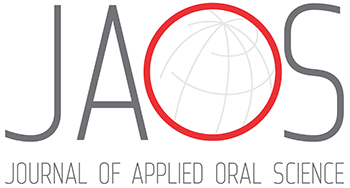Temporomandibular dysfunction (TMD) is a complex disturbance that involves the masticatory muscles and/or temporomandibular joint, causing damage to the masticatory function. This study evaluated the electromyographic activity of the masseter muscle during habitual mastication of bread, apple, banana, cashew nut and paraffin film (Parafilm M) in 25 adult subjects, of both gender, with TMD. The results were compared to those of a control group, composed of 15 adult subjects, of both sexes, free of signs and/or symptoms of TMD. The MYO-TRONICS Inc., K6-I computer software was used for electromyographic processing and analyzed the following parameters: duration of the act, duration of the masticatory cycle and number of cycles. No significant differences were found between subjects in the control group and individuals with TMD as to duration of the masticatory act and of the masticatory cycle, considering all materials used for mastication. The duration of the masticatory act and cycle was longer during mastication of paraffin film in both groups. The number of masticatory cycles was higher for mastication of apple in comparison to mastication of banana, in both groups. It can be concluded that the consistency of foods influences the duration parameters of the act, duration of the cycle and the number of masticatory cycles, and the behavior of the masticatory muscles in individuals with TMD during habitual mastication is similar to that verified in individuals without TMD.
Mastication; Electromyography; Food; Temporomandibular joint disorders



